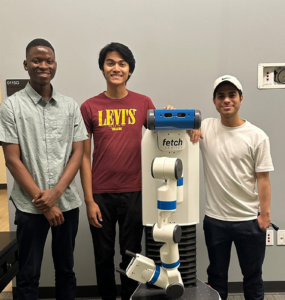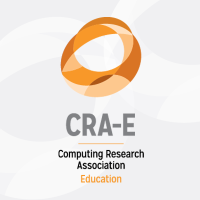Summer Courses Are In Session: UR2PhD Is Supporting The Next Generation of Researchers
By Julia Sepúlveda, Program Associate, CRA-E

Uthman Tijani and his undergraduate mentees
The UR2PhD program is an initiative that aims to drastically increase the number of women and gender-marginalized folks pursuing graduate studies in computing. As part of the program, the Computing Research Association (CRA) offers two summer courses: a graduate student mentor training and an undergraduate research methods course. Together, the courses seek to improve the quality of undergraduate research experiences and encourage students to pursue additional opportunities in the field.
In the graduate student mentor training course, participants learn both theoretical and practical frameworks for supporting the personal and professional development of their mentees. This summer, there are 19 graduate students enrolled in the program. While many of them have prior mentorship experience that they are building on, several participants seek new and concrete strategies for engaging with their mentees. Uthman Tijani, a graduate student at the University of South Florida and participant of the course, shared, “I decided to take the UR2PhD mentor training course to master effective mentorship practices that will empower my mentees on their research journeys. Additionally, this training will improve my leadership skills, preparing me for future roles in both academia and industry by fostering a supportive and inclusive research environment.” Our team is excited to see how our mentors apply what they learn.
Undergraduate students participating in our research methods course are strengthening their capabilities and building their confidence as researchers. There are more than 80 students enrolled across the two sections. As part of the course, students are required to be actively engaged in a research project. Many of our participants are working on projects that have, or will have, a significant impact on their community. For example, one group is working on developing a centralized data repository for sustainable systems research in Colorado, and another is developing and evaluating educational interventions to increase social media safety for young adults on the autism spectrum.
By the end of the summer, undergraduate participants in the course will know how to read a research paper, how to conduct a literature review, and how to write and present technical information. They will have generated a research proposal describing the research project they are engaged in, with a deeper understanding based on their project related-assignments in the course. Several participants expressed excitement about the structured learning environment that will allow them to practice the skills they need to be successful researchers. One undergraduate participant from the University of Massachusetts at Amherst, noted “I look forward to learning from mentors, engaging with like-minded peers, and preparing myself for a successful transition to a PhD program, with the goal of contributing to diverse and impactful research in the future.”
Through these courses, the UR2PhD initiative hopes to encourage faculty mentors to take on new undergraduate student researchers. The program assists them by offering their mentees guidance and advice for approaching research and research development, thus enabling mentors to focus more on technical assistance rather than foundational skills. Faculty mentors who are able to engage graduate students in the undergraduate research mentoring process are also ensuring that their graduate students are able to practice and develop new professional skills.
The UR2PhD program plans to offer both courses again in the fall, with the graduate course beginning in late August and the undergraduate course starting in September. To learn more about the courses, please visit our website: www.cra.org/ur2phd








